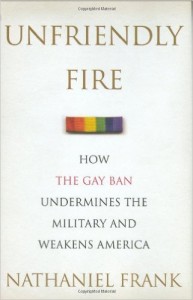 Unfriendly Fire: How the Gay Ban Undermines the Military and Weakens America
Unfriendly Fire: How the Gay Ban Undermines the Military and Weakens America
by Nathaniel Frank
Thomas Dunne Books. 342 pages, $25.95
WHEN the U.S. military’s “Don’t ask, don’t tell” policy went into effect on March 1, 1994, it sounded like a way for the military to look the other way when it came to lesbians and gays in uniform, a sort of “we just won’t discuss it” edict. But the “don’t ask” clause whereby a superior couldn’t ask about a soldier’s sexual orientation came with a “don’t tell” clause that forced gay soldiers not to disclose their sexual orientation in any way. Since word often got out one way or another, many thousands of soldiers have been discharged over the past fifteen years.
As Nathaniel Frank points out in Unfriendly Fire, gay men and lesbians have a long history in the military and continue to serve today. He estimates that some 65,000 gay and lesbian Americans serve in all branches of the military, and argues that without them the military would suffer significantly in its effectiveness. He describes many cases of uniformed soldiers who have risen through the ranks, gotten high marks from their superiors, and become important assets to their departments, only to be unceremoniously relieved of duty when their homosexuality came to light. He also reports on the numerous gay men and lesbians who’ve been harassed and who hastily left the military for their own safety. But this book also reports on some emerging positive trends. Openly gay military personnel increasingly report that rules are being relaxed or merely ignored. “Don’t ask, don’t tell” may be on its way to “Don’t worry.”
To be sure, Unfriendly Fire is well researched and contains over thirty pages of source notes on the text. Indeed, one could argue that the book is almost excessive in its thoroughness. Much of it goes back over ancient history complete with fifteen years of political minutiae as politicians and the Pentagon have wrangled over this issue. Because Bill Clinton was the president responsible for the “Don’t ask, don’t tell” policy, there are pages and pages of Clinton-era White House legal briefs, rulings, and Congressional goings-on, included here in mind-numbing detail. Alliances, politicians, and names from the past float up from a wasteland that might best be relegated to the dustbin of history.
While all these incidentals can tell us something about how this policy came to pass, it doesn’t give an adequate update on how it affects troops today. We’re largely left to connect our own dots. Worse, readers who are affected by the policies described here, particularly young people who are joining the military now, won’t remember what happened two administrations ago, nor will they remember the players who created this military mess. While specialists looking for a detailed history of the ban will undoubtedly find some information that is new, readers interested in what the book’s subtitle promises, a probe into “how the gay ban undermines the military and weakens America,” are likely to be disappointed.





